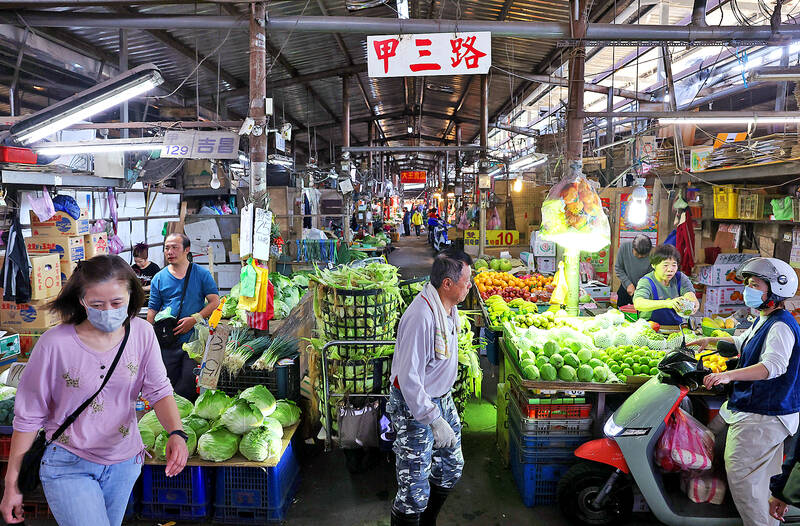Taiwanese this month shed confidence about the nation’s economic outlook, but expressed greater willingness to invest in stocks as financial markets at home and abroad rally to record highs amid a boom in artificial intelligence (AI), a Cathay Financial Holding Co (國泰金控) survey showed yesterday.
Thirty-eight percent of respondents believed the economy would improve in the next six months, 28.6 percent said it would deteriorate and 19.4 percent expected it to hold steady, the survey found.
Sentiment was weaker compared with a month earlier, as GDP growth is expected to be 2.6 percent this year, lower than a government forecast in November last year of 3.35 percent.

Photo: CNA
The Directorate-General of Budget, Accounting and Statistics (DGBAS) is to renew its GDP projection next week.
The sentiment decline likely has to do with expectations by 55 percent of respondents that the consumer price index would climb above 2 percent this year, although the DGBAS has predicted it would slow to 1.64 percent, the survey showed.
The government has indicated plans to increase electricity rates across the board next month to reflect rising fuel prices and to mitigate losses by Taiwan Power Co (台電).
Electricity price increases would boost inflation.
The survey showed that 28.6 percent expect job hunting to become more difficult, while 22.4 percent said it would become easier.
Respondents were positive about the local exchange, with 42.7 percent expecting the TAIEX to rally in the next six months, while 22.8 percent expected a downturn and 20.6 percent had a neutral view, it said.
The TAIEX has benefited from global fund inflows seeking to take advantage of a recovery in technology products.
Leading tech firms released strong earnings results for last quarter and are upbeat about business prospects, citing fast-growing AI applications.
Taiwan is home to the world’s major suppliers of AI severs, high-performance computing chips and graphics cards.
The survey showed that 35.3 percent of respondents expect to increase their holdings of local shares, while 14.2 percent would cut positions and 50.5 percent would maintain their current level of investment.
Regarding large-item purchases, 34.5 percent would increase their budget for such items while 20.7 percent would tighten on such consumption, the survey showed.
Thirty-point-six percent intend to travel overseas more than usual this year, 11 percent aim to cut the frequency and 23.8 percent would keep their travel rates unchanged, it showed.
The results indicate that Taiwan faces a tourism deficit, with domestic hospitality providers facing pressure unless tourism arrivals increase.
Many respondents called on president-elect William Lai (賴清德) to give top priority to lowering home prices, improving wages and stabilizing consumer prices.

Sweeping policy changes under US Secretary of Health and Human Services Robert F. Kennedy Jr are having a chilling effect on vaccine makers as anti-vaccine rhetoric has turned into concrete changes in inoculation schedules and recommendations, investors and executives said. The administration of US President Donald Trump has in the past year upended vaccine recommendations, with the country last month ending its longstanding guidance that all children receive inoculations against flu, hepatitis A and other diseases. The unprecedented changes have led to diminished vaccine usage, hurt the investment case for some biotechs, and created a drag that would likely dent revenues and

Global semiconductor stocks advanced yesterday, as comments by Nvidia Corp chief executive officer Jensen Huang (黃仁勳) at Davos, Switzerland, helped reinforce investor enthusiasm for artificial intelligence (AI). Samsung Electronics Co gained as much as 5 percent to an all-time high, helping drive South Korea’s benchmark KOSPI above 5,000 for the first time. That came after the Philadelphia Semiconductor Index rose more than 3 percent to a fresh record on Wednesday, with a boost from Nvidia. The gains came amid broad risk-on trade after US President Donald Trump withdrew his threat of tariffs on some European nations over backing for Greenland. Huang further

Macronix International Co (旺宏), the world’s biggest NOR flash memory supplier, yesterday said it would spend NT$22 billion (US$699.1 million) on capacity expansion this year to increase its production of mid-to-low-density memory chips as the world’s major memorychip suppliers are phasing out the market. The company said its planned capital expenditures are about 11 times higher than the NT$1.8 billion it spent on new facilities and equipment last year. A majority of this year’s outlay would be allocated to step up capacity of multi-level cell (MLC) NAND flash memory chips, which are used in embedded multimedia cards (eMMC), a managed

CULPRITS: Factors that affected the slip included falling global crude oil prices, wait-and-see consumer attitudes due to US tariffs and a different Lunar New Year holiday schedule Taiwan’s retail sales ended a nine-year growth streak last year, slipping 0.2 percent from a year earlier as uncertainty over US tariff policies affected demand for durable goods, data released on Friday by the Ministry of Economic Affairs showed. Last year’s retail sales totaled NT$4.84 trillion (US$153.27 billion), down about NT$9.5 billion, or 0.2 percent, from 2024. Despite the decline, the figure was still the second-highest annual sales total on record. Ministry statistics department deputy head Chen Yu-fang (陳玉芳) said sales of cars, motorcycles and related products, which accounted for 17.4 percent of total retail rales last year, fell NT$68.1 billion, or